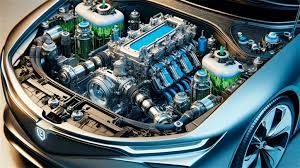Islamabad, JULY29: An innovative operator in the clean energy space, Triton Electric Vehicle LLC, has unveiled a novel internal combustion engine (ICE) that runs on hydrogen. Given that Triton EV also creates EVs, this innovation puts the company in an intriguing position and has the potential to transform environmentally friendly transportation.
The corporation has significant research and production facilities in India, and its headquarters are in Cherry Hill, New Jersey. The new internal combustion engine (ICE) from Triton EV runs on hydrogen, an inexpensive and clean fuel that produces no emissions in contrast to standard gasoline engines that release harmful emissions. Since water vapor is the only result of the hydrogen ICE, it is an environmentally benign substitute.
More Eco-Friendly and More Efficient
Triton EV’s founder and managing director, Himanshu Patel, emphasized that the engine is made to burn hydrogen efficiently, which improves thermal efficiency over traditional engines. This concept offers a practical and sustainable solution for a range of vehicle types by improving fuel efficiency and lowering operating expenses.
With an emphasis on the heavy vehicle sector, Triton EV is extending the use of its hydrogen technology beyond passenger automobiles. The company’s hydrogen-powered trucks have an electric motor and a hydrogen fuel cell, and they are made at its Bhuj facility in Gujarat. For heavy-duty applications, this combination offers tremendous torque and economical energy consumption.
Not Everything Is Sunshine and Rainbows
Even while hydrogen engines have several advantages over conventional auto engines, there is a serious environmental problem that goes unnoticed by many. The majority of hydrogen utilized in automobiles nowadays is generated commercially through the breakdown of oil, which produces a large amount of CO2 emissions. If hydrogen cars are to become popular, a significant revision of the commercial hydrogen generation process is required, as this does not address the problem of environmental contamination.
Everything that a company says it is “environmentally friendly” should be regarded with a grain of salt. Lithium and rare earth metals are even used in the development of electric car batteries, and the mining and processing of these metals has a severe negative environmental impact.
Thankfully, solar-powered electrolysis is gradually becoming a more practical method of creating hydrogen, and it doesn’t produce any hazardous byproducts like CO2.









